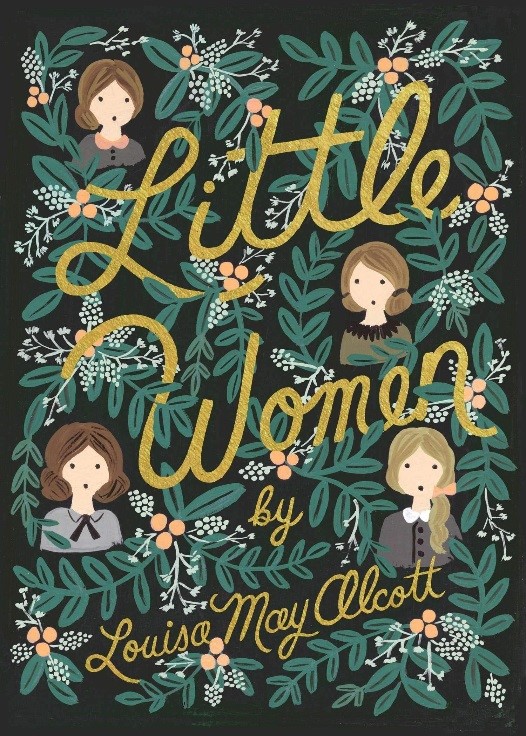
Little Women by Louisa May Alcott is a two-part novel that follows the lives of the March sisters — Meg, Jo, Beth, and Amy — and their mother as they endure hardships and grow up. The book is set in the 19th century in Massachusetts around the time of the Civil War. The war does not play a prominent role in the book, though, besides the fact that their father is away serving as a chaplain for a part of it.
The first part of the novel introduces the reader to the March family. We see the four sisters as well as their mother experience a variety of hardships. One of the main challenges they face is poverty; though many times the young girls long for more or better things, Alcott shows that poverty makes them altogether richer in character and more virtuous than some of the rich people they associate with.
The second part, published after the first but now collected into one novel, shows more of the March family’s development as the sisters begin to go their own separate ways in life. The reader sees most of the characters grow up and face both the hardships of adulthood and the social constructs of the 19th century.
The context within which this novel was written plays a large role in it. Little Women can often feel moralizing, with a religious agenda as well as many lessons on the importance of work (as opposed to idleness) and being virtuous.
The book sometimes sacrifices a natural atmosphere for such lessons. In one chapter, Marmee (the March matriarch) lets the girls carry out an experiment of only playing with no work; surprise, surprise, the household is neglected as are the pets, and the girls learn the consequences of being lazy and vow never to remain idle for so long again. The lack of subtlety in this teaching felt a bit patronizing, but perhaps I am a bit biased, living in an age of necessized constant productivity and looking to books for relaxation and pleasure.
One thing that especially disappointed me was Jo’s fate — the novel introduces the concept of “castles in the air” which represent the girls’ dreams and aspirations. Jo’s is to become an accomplished author. Jo struggles as an author trying to find a niche for herself, but does not end the story as a so-called “literary spinster.” Her role as a writer sort of fades a bit, though, in the final pages, she comments that she has not yet given up those aspirations.
This ending confused me, as Jo was always contrasted with her sisters as being headstrong and stubborn and doing what she likes, and writing was emphasized as something that made her very happy. Upon further research, though, I found out that this has a bit of a complex reason having to do with both the autobiographical nature of the story, as Jo is supposed to be a fictionalization of Louisa May Alcott herself, and societal expectations of the time. Greta Gerwig, who directed the 2019 film of Little Women, alters this ending into something I think is much more desirable, so if you do read this book and feel unsatisfied with Jo’s ending, I would recommend watching the film. A bit of a disclaimer, though: I have not watched the movie, I simply stumbled upon Gerwig’s version while trying to figure out why the novel ended up the way it did.
Despite its (sometimes infuriatingly) outdated themes, Little Women still has an undeniable charm in the characters and the world. Something I enjoyed was that the novel felt like a bit of an escape; the characters felt real as did the challenges they faced, and I watched the lives of the March sisters unfold with fascination. I think there is some merit to the fact that I accidentally spoiled two major plot points for myself, but read on as I wanted to know exactly what would lead to those things happened and how they would impact the lives of the girls.
Overall, Little Women is an interesting book to experience. I, personally, did not love it and began reading it expecting not to, but would still give it 4/5 stars just because of how captivating and somehow still enjoyable it managed to be. I think this book would be best for those who enjoy classics or the writing of Jane Austen or Charlotte Brontë, though anyone who does has probably already read this.